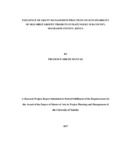| dc.contributor.author | Munyao, Prudence M | |
| dc.date.accessioned | 2017-12-04T10:55:06Z | |
| dc.date.available | 2017-12-04T10:55:06Z | |
| dc.date.issued | 2017 | |
| dc.identifier.uri | http://hdl.handle.net/11295/101531 | |
| dc.description.abstract | While funding opportunities for groups has been increasing especially with grants from the Kenya government and other sources, there is a huge disparity between the implemented granted self-help groups and the sustainable ones in Matungulu sub county, Machakos County. The study sought to fill this gap by assessing the influence of grant management practices on sustainability of self-help group projects that benefit from government grants in Matungulu sub-county, Kenya. The study was guided by objectives: to determine how effective grant design as a grant management practice influences sustainability of self- help group projects in Matungulu sub-county; to establish how strategic planning as a grant management practice influences sustainability of self-help group projects in Matungulu sub-county; to examine how training as a grant management practice influences sustainability of self- help group projects in Matungulu sub-county and to access how monitoring and evaluation as a grant management practice influence sustainability of self-help group projects in Matungulu sub-county. The study is based on the following assumptions: those respondents would provide honest and reliable responses which would lead to unbiased conclusions that grants management practices influences sustainability of self-help projects, that the self-help group officials are also knowledgeable enough to apply grant management practices. This study adds value to the self-help groups especially by suggesting how to improve on their grant management practices and consequently sustain their projects. It would also help the Ministry of labor, social security and social services as well as the county government in making policies that would guarantee proper grant management and sustainability of granted projects. The study applied Resource based view theory by Wernerfelt which suggests that competitiveness can be achieved by innovatively delivering superior value to customers. A conceptual framework shows the relationship between variables. The study targeted 35 self-help groups which had benefited from grants; with a total target population of 568. Using Krejcie and Morgan table the sample size was 234 respondents who included the self-help group members, the social development officer and volunteers. The data was collected using questionnaires and interview schedule. The collected data was analyzed using SPSS as a tool and the results presented through tables and percentages followed by discussions for each of the findings. The study established that most groups lived beyond the grants period. However, they still survive on minimal resources and are yet to really grow their capital to the most sustainable levels. The researcher also established some good practices like stable and rotational leadership meaning that the group projects are not personalized. Some have also tried to diversify and have alternative sources of funds which increase the chances of sustaining their projects. Regular training and monitoring and evaluation need to be enhanced in order for the groups to reap maximum benefits. The study recommends that; employing social development officers as their role is very critical in empowering local self-help groups through training, monitoring and evaluation of group projects and even design of group projects. Regular training and monitoring and evaluation need to be enhanced in order for the groups to reap maximum benefits and the amount of grants should be increased and be provided in phases to boost the self-help group activities, this will reduce incidences of projects failing due to inadequate funding | en_US |
| dc.language.iso | en | en_US |
| dc.publisher | University of Nairobi | en_US |
| dc.rights | Attribution-NonCommercial-NoDerivs 3.0 United States | * |
| dc.rights.uri | http://creativecommons.org/licenses/by-nc-nd/3.0/us/ | * |
| dc.subject | Self-Help Groups’ Projects | en_US |
| dc.title | Influence Of Grant Management Practices On Sustainability Of Self-Help Groups’ Projects In Matungulu Sub-County, Machakos County, Kenya | en_US |
| dc.type | Thesis | en_US |



